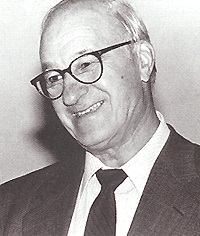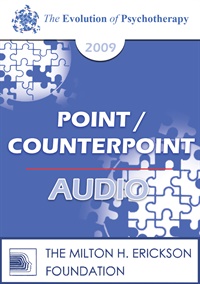EP09 Point/Counterpoint 07 - Moral Disengagement - Albert Bandura, PhD
- Average Rating:
- Not yet rated
- Topic Areas:
- Point/Counterpoint Sessions | Psychotherapy | Social Psychology
- Categories:
- Evolution of Psychotherapy | Evolution of Psychotherapy 2009
- Faculty:
- Albert Bandura
- Duration:
- 1 Hour 24 Minutes
- Format:
- Audio Only
- Original Program Date:
- Dec 10, 2009
- License:
- Never Expires.
Description
Description: This session stages a searching exchange on moral disengagement, asking how ordinary people, institutions, and even helping professions drift into justifying harm. Through theory, case examples, and pointed critique, it examines dehumanization, responsibility, power, and the ethical blind spots that show up in war, corporations, media, mental health, and family systems. The dialogue challenges therapists and students to examine their own practices, rethink neutrality, and consider how psychological ideas can either protect human dignity or quietly erode it
Syllabus Description: This presentation addresses how otherwise good people can do cruel things. They do so through selective disengagement of moral self-sanctions from inhumane conduct. At the behavior locus, worthy ends are used to sanctify harmful means by social and moral justification. At the agency locus, people obscure personal responsibility by displacement and diffusion of responsibility. At the outcomes locus, the detrimental social effects of one’s actions are ignored, minimized, or disrupted. At the victim locus, perpetrators dehumanize and blame recipients for bringing the maltreatment on themselves. These mechanisms operate at both individual and social systems levels. Disengagement of moral agency is illustrated in the workings of the corporate world, terrorism, the use of military force, application of the death penalty, and in ecological destruction that is heating the planet and making it less habitable.
Educational Objectives:
- To describe the different mechanisms through which people disengage moral self-sanctions from detrimental conduct.
- To list the social conditions that foster moral disengagement.
*Sessions may be edited for content and to preserve confidentiality*
Credits
Faculty

Albert Bandura Related Seminars and Products
ALBERT BANDURA, Ph.D., is Professor of Psychology, Stanford University. He has been elected to the American Academy of Arts and Sciences and the Institute of Medicine of the National Academy of Science. Dr. Bandura is a proponent of Self-Efficacy Theory. This theory and its diverse applications are presented in his recently published book, Self-Efficacy: The Exercise of Control.
Bandura has been responsible for contributions to the field of education and to several fields of psychology, including social cognitive theory, therapy, and personality psychology, and was also of incluence in the transition between behaviorism and cognitive psychology. He is known as the originator of social learning theory (renamed the social cognitive theory) and the theoretical construct of self-efficacy, and is also responsible for the influential 1961 Bobo doll experiment. This Bobo doll experiment demonstrated the concept of observational learning.


